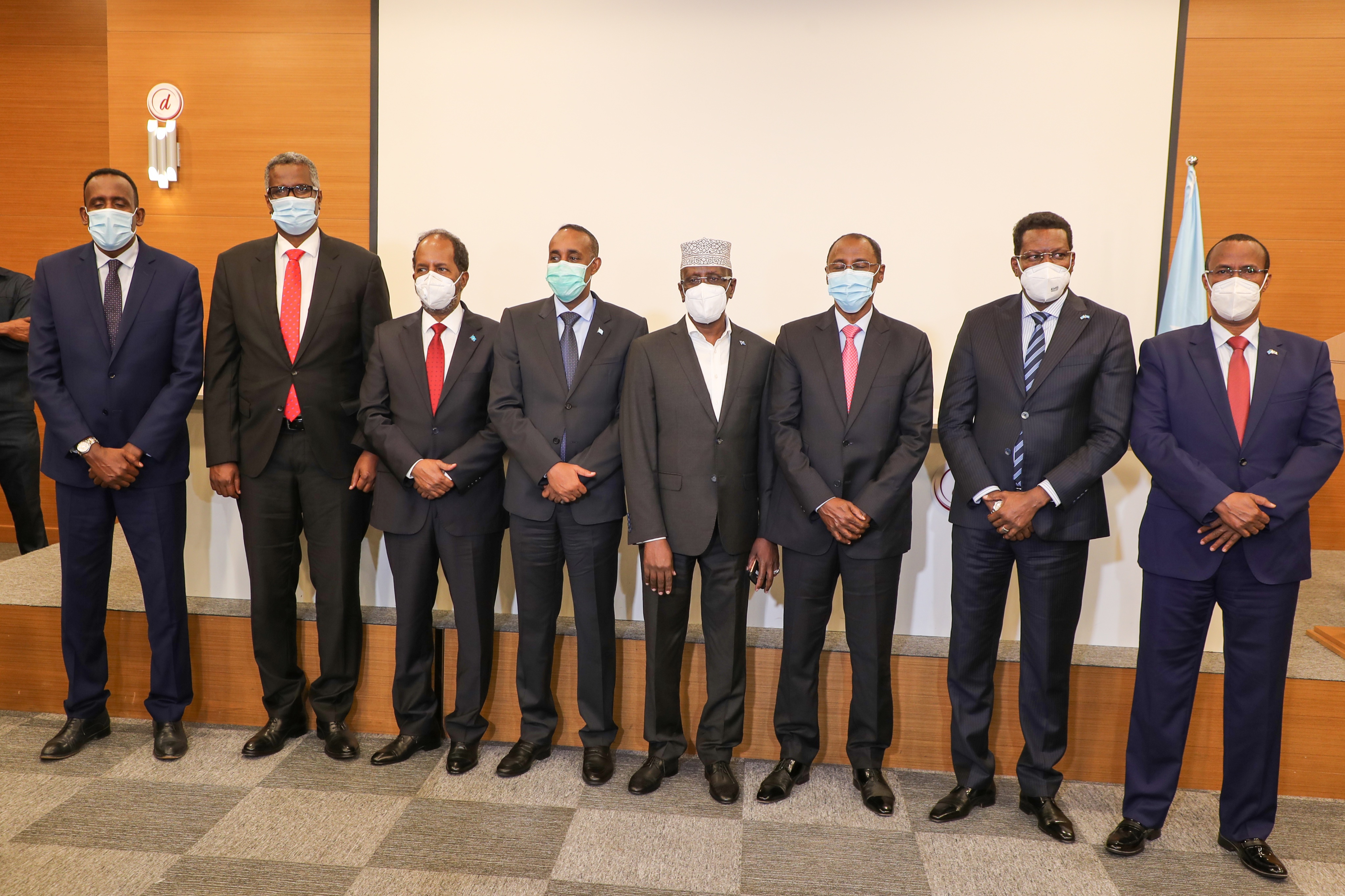The unique role of Somali PM in breaking the election impasse

By Dhakade Osman
Somalia is facing election standoffs as the Country was scheduled to hold Parliamentary elections late last year with President Mohamed Abdullahi Farmajo`s four-year term in office expired on February 8, with no ongoing talks to reach a final agreement over the implementation of the 17 September Deal.
Since July 2020, Dhusamarreeb City Hosted 4 rounds of talks on the Country`s elections which three of them became a solid base of 17 September Mogadishu agreement.
President Farmaajo reached an agreement in September with leaders of Somalia’s semi-autonomous states in a bid to hold indirect Parliamentary and Presidential elections but the deal has met with snags when squabbles erupted over the implementation mechanism of the deal.
In the first week of February 2021 the Government announced a 5th round meeting in Dhusamarrreb with the regional leaders to salvage the September agreement and reach a new final election implementation Consensus but unfortunately these talks collapsed, with the Federal Minister for Information Osman Abokor Dubbe`s media briefing in Dhuusamareeb said the Gedo issue had turned out to be an obstacle, it was clear that the Gedo issue was the meetings` sticking point, and yet remains to be solved with even the mistrust between the Government and States of Puntland and Jubbaland has been on the rise.
The rise and the outcome of the Council of Presidential Candidates Union move
With this standoff, the Council of Presidential Candidate’s Union (CPCU) started putting pressure on the Government to accelerate the election process by mobilizing demonstrations against the government at Daljirka Dhasoon in Mogadishu. A response by security forces resulted in deadly clashes.
This escalated an already tense situation surrounding elections delay but was eased by Government discussions and flowed joint Statement with the Council of Presidential Candidate’s Union with the lead of Prime Minister Mohamed Hussein Roble, and the terms agreed changed the political and security atmosphere particularly in Mogadishu creating hope that Somalis could agree without International Communities` direct interference.
Although this made clear the political weight of the Opposition Coalition, also highlighted the Positive role of the Prime Minister, not only to represent his Government`s election mechanism but also to satisfy all parts involved in the election processes as his give and take at Decale discussions paved the way for the crucial join statement reached that night between parties. And even positively, the two States of Puntland and Jubaland welcomed the result of Decale meeting.
What to learn from the International Community in times of Political disputes
Amid month`s long dispute over the Country’s election, we have seen IC continued its calls for calm and restraint to prevent tensions from escalating further.
If we have to admit the fact that the role of the International Community is not directly interfering the country`s domestic affairs, then this kind of positions by the International Community teaches us that the current electoral impasse can be solved only by Somalis and that the Prime Minister must lead in reaching a consensus.
It is certain that the solution is in the hands of Somali parties including Opposition and Civil society groups but with the lead of the Somali Government.
Now, with the current election impasse, there is a real opportunity for the leaders of Government particularly the Prime Minister, who is head of Government to overcome these standoffs by investing concessions as long as it is in the best interest of the Country and the People.
With the Prime Minister is not so far Presidential Candidate, he is seen by regional States and Opposition Coalition to act a neural role which could unify and satisfy all by carefully considering all sticking points and other concerns raised by Puntland, Jubbaland and the CPCU including proper meeting venue and even to give a say to Civil Society groups.
This is how the government could lead a successful vital role to urgently resume a short term dialogue that could yield an accepted pact over the implementation of the 17 September agreement.
The flexibility by Government during discussions with CPCU at Decale Hotel had shown hope and opportunity that could lead the country to a final round of talks and to reach a Consensus clarifying the 17 September agreement to hold inclusive elections in the Country.
In this particular point, the unique responsibility to dealing with this impasse rests on the Prime Minister’s shoulders as a Head of Government. The Prime Minister needs to come up with a leadership role and turn this support into an opportunity answering the concerns of Regional states leaders as well as the Opposition in addition to resting his close cooperation and confidence with President Farmaajo to resume talks urgently for consensus.
Given that the Prime Minister was appointed after the 17 September election deal to lead the Country`s election process based on the 17 September Agreement, taking into account that he is not so far a Presidential Candidate and if you look at the fact he is enjoying the support of CPCU as well as the five regional States based on his leading role on discussions with CPCU facilitated by Galmudug and Hirshabelle and welcomed by states of Puntland and Jubbaland, the Prime Minister has a unique opportunity to carefully lead and manage a proper, peaceful and inclusive arrangements over an urgent consensus on the implementation of the 17 September election Deal.
The author holds a MA in International Relations & Diplomacy
He can be reached via: [email protected]